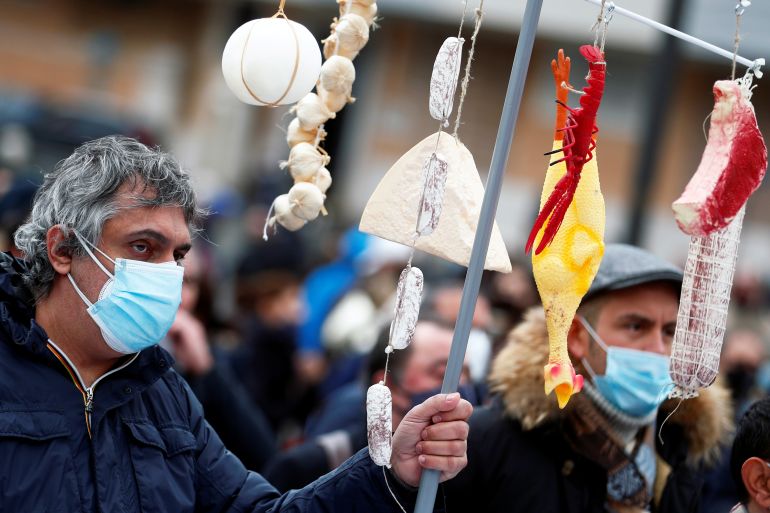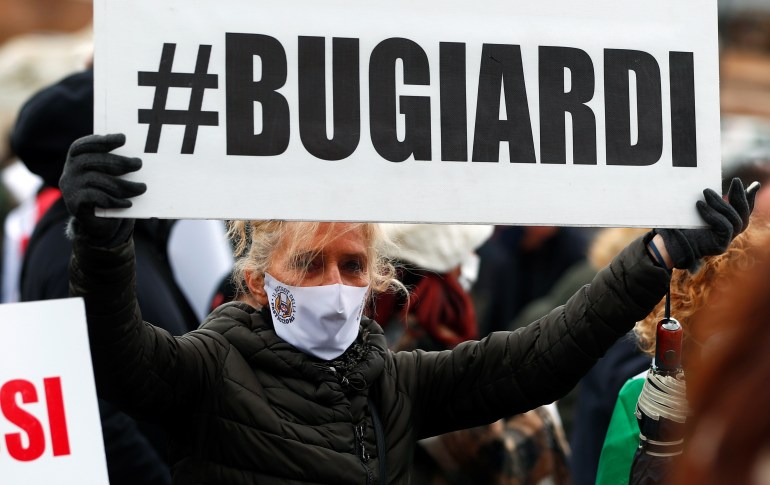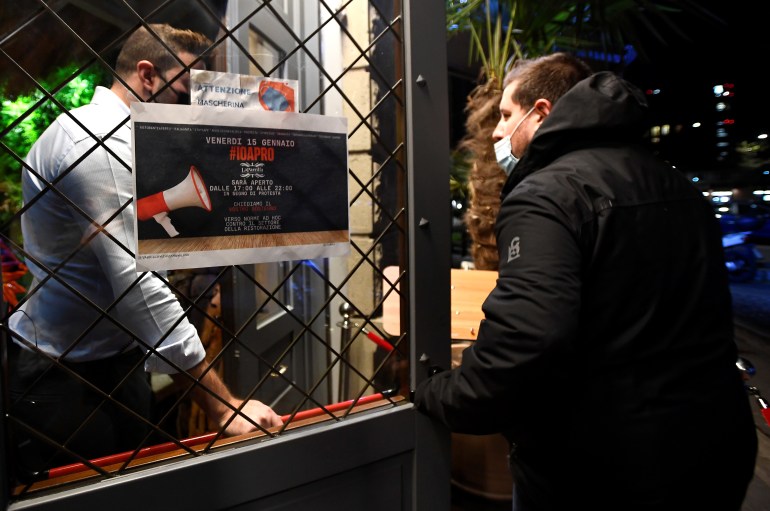‘Valley of tears’: Political crisis adds to Italians’ woes
Business owners are particularly concerned that relief funds will be held up while a new government is formed.

Rome, Italy – Paolo Bianchini has not paid much attention to the 35 changes in government that have taken place in his lifetime – until this year.
Bianchini, 44, owns a restaurant in Viterbo, about 80 kilometres (50 miles) from the capital, Rome.
Keep reading
list of 3 itemsItaly: ‘Cornerstone’ mafia trial begins with hundreds in dock
Italy’s Conte survives close Senate vote, pledges to forge ahead
But the business he has owned for 20 years now hangs by a thread, as support measures amounting to 32 billion euros ($39bn) for activities ravaged by the pandemic have again been put on hold, this time after the Italian government fell on Tuesday.
Prime Minister Giuseppe Conte’s resignation has plunged the country into further chaos.
Italians are usually able to ignore government frictions, the norm in a country that has been through 66 coalitions since World War II.
But this time, the political crisis is happening during a global pandemic.
The national psyche is already deeply scarred by the epidemic, that has taken 86,000 lives and led to a brutal economic recession.
“The situation is not sustainable any more,” said Bianchini, who is also president of MIO, a hospitality sector association. “We can’t even get the money to buy food for our children … this really risks jeopardising the social fabric [of our society].”

The drama
Conte resigned after the small, but key, coalition partner Italia Viva – led by Matteo Renzi – withdrew its support from the government.
During a frantic week, the once little-known-lawyer failed to persuade other members of Parliament to join his ranks and form a stronger parliamentary majority, prompting him to step down.
Now, President Sergio Mattarella is consulting all parties to consider whether Conte, or someone else, has the numbers to form a new coalition.
If that is not possible, a technocratic government could be set as an alternative. Otherwise, Italians will have to return at the ballot box.
Both governing parties, the Democratic Party (PD) and the Five Star Movement – who joined a weak alliance only 17 months ago – are eager to avoid such scenario as polls suggest that the far-right League party could lead the electoral race.
Since Wednesday, political parties have been strategically forging and breaking alliances in the halls of power.
Meanwhile, thousands of restaurants and café owners staged a three-day protest in the streets of Rome against ongoing social distancing restrictions aimed at curbing the spread of the virus.
“We don’t need a different government, we need measures,” said Alessandro Berardi, 38, who opened a new restaurant in the northwestern town of Rapallo in May 2019. So far, has received 4,000 euros ($4,860) from the state.
As January ends, his savings have run out.
Anger simmers in other sectors, too.
“It’s a valley of tears,” said Mauro Rossetti, 47, one of the founders of Easyfit Gyms, a network of sport centres in Rome.
His business was worth five million euros ($6m) two years before the pandemic.
As gyms have been closed since late October, Rossetti lost between 70 and 75 percent in revenue.
His business received 6,000 euros ($7,290) in state funds – “a joke”, Rossetti said.

No governance
A transitional government could adopt measures related to the coronavirus emergency, but without governance, its work is expected to be hampered.
On top of the billions waiting to be allocated for businesses in need, questions are mounting over the effect of the crisis – and whether Italy has the capacity to make good use of the 209 billion euros ($254bn) it is set to receive from the European Union.
Flavia Terribile, an economist and the chair of the OECD Regional Development Policy Committee, said that technical meetings between the EU Commission and ministry of the economy were ongoing.
“But you need a government and a political guide to select goals and object priorities,” she said. “And a political crisis shortens the time to draw and negotiate a good plan with the regions, local authorities and civil society to relaunch the country.”
‘A problem of trust’
According to experts, the political crisis may deepen feelings of disenchantment, fear and uncertainty, and could lead to further unrest and divisive politics.
“There is a problem of trust between demand and political supply,” said Nicola Pasini, professor of political science at the University of Milan.
“Even from those who were supposed to dismantle the traditional centres of power, but now become part of it,” he said, referring to the Five Star Movement.
The populist party won the 2018 election with 32 percent of votes by intercepting a broad section of the electorate who were dissatisfied with the traditional left and right parties.
Today, the movement’s popularity is far weaker – less than 15 percent.
“As a hotelier, I wonder how can they (politicians) be that far from the actual problems of the country,” said Pierpaolo Biondi, who owns a hotel near the Sicilian town of Taormina, a tourist hub before the pandemic, and is president of the local branch of Federalberghi, the national hotel owners’ association.